On January 25th a filmed report by the BBC Jerusalem bureau’s Yolande Knell appeared on the BBC News website’s ‘Middle East’ page under the title ‘Covid-19: Vaccine divides in the Middle East’.
As soon became apparent in the synopsis, the BBC actually had no intention of informing its audiences about different levels of immunization against Covid-19 “in the Middle East”. The report chose to completely ignore the situation in places such as Syria, Yemen or Lebanon, instead focusing viewers’ attentions on one location which has already been the topic of copious multi-platform coverage as a result of the BBC’s self-conscription to a political campaign.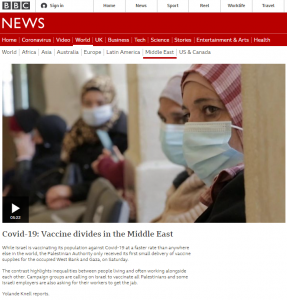
“While Israel is vaccinating its population against Covid-19 at a faster rate than anywhere else in the world, the Palestinian Authority only received its first small delivery of vaccine supplies for the occupied West Bank and Gaza, on Saturday.
The contrast highlights inequalities between people living and often working alongside each other. Campaign groups are calling on Israel to vaccinate all Palestinians and some Israeli employers are also asking for their workers to get the jab.”
At no point in Knell’s nearly five and a half minute-long report was any effort made to inform audiences of the identity of those “campaign groups” and their political agenda.
The report began with Knell posed against the background of a graffiti-covered concrete section of the anti-terrorist fence which also featured extensively in the rest of the film. [emphasis in italics in the original, emphasis in bold added]
Knell: “We’ve been hearing a lot about how Israel’s giving out vaccines against Covid faster than any country but the Palestinians have been slow just to get supplies. All around the world there are vaccine haves and have-nots but this is one of the starkest examples because people here live and work closely together. It’s a complicated picture.”
Unsurprisingly, all four of Knell’s interviewees throughout the report communicated the same uniform message: the claim that Israel should be vaccinating people who – although audiences were not told so – are not Israeli citizens, do not pay the taxes which bought the vaccines that Israel has secured and are not members of any of the four health insurance companies in Israel.
Knell’s first interviewee is a doctor at the Augusta Victoria hospital in Jerusalem. Her description of its location led viewers to believe that an area which was previously illegally occupied by Jordan and prior to that, part of the League of Nations Mandate for Palestine is ‘Palestinian territory’.
Knell: “…it’s in East Jerusalem, part of the Palestinian territories annexed by Israel and under its full control. So here, Israel is vaccinating Dr Fadi and the rest of the medical staff. But not the patients who come from across the occupied West Bank and Gaza Strip.”
Dr al-Atrash: “I got the vaccine but I’m not relieved. We were not able to deliver vaccination to our patients, to our families back in the West Bank and Gaza. There is a problem of inequality. You don’t feel happy that you are getting the vaccination and the other part of your people cannot.”
Knell then told viewers that:
Knell: “What makes him feel worse is that the healthcare systems in other Palestinian areas are struggling so much more.”
According to a report published by Ha’aretz on the same day that Knell’s film appeared:
“Meanwhile, Palestinians in the West Bank and the Gaza Strip await vaccines, which could take at least a few more months to get to a big enough part of society. Infection rates in both territories, however, are being kept relatively low.
Israel currently has 76,688 active cases; 4,419 people have died. In the West Bank, there are 4,779 active cases and 1,428 deaths, and in Gaza 5,603 active cases and 497 deaths.”
Those figures indicate that the number of active cases in Israel is currently over four times higher per million people than in the areas controlled by the Palestinian Authority and Hamas but Yolande Knell’s viewers were not given that relevant information. Viewers then saw Knell’s sole – yet decidedly unhelpful – ‘he said-she said’ presentation of the actual subject matter of her report.
Knell: “There’s a hot debate about who should be vaccinating Palestinians in the West Bank and Gaza. Those who think it’s Israel’s responsibility point to the Geneva Conventions. Those who say it’s up to the Palestinian Authority look to the Oslo Accords. It all adds to the long list of unresolved issues that experts on international law disagree on here.”
Knell next drove from Jerusalem to Ramallah – claiming on route that “infection rates are high” in the PA controlled area – to provide BBC audiences with the apparently essential view of an actress. Manal Awad repeated the ‘inequality’ theme promoted by the previous interviewee and advanced the canard that Israel ‘controls’ everyday life in a city that has been under exclusive Palestinian Authority control for more than a quarter of a century.
Awad: “There is kind of this discrimination because in the end we are so much in connection with the Israelis either by people working there or in daily life. They are controlling our everyday life. So it is unfair that they got the vaccine and we have not.”
Failing to mention that the Palestinian Authority only jumped on the bandwagon some two and a half weeks after ten political NGOs launched their campaign, Knell then gave her explanation of a wrinkle in her story:
Knell: “The Palestinian Authority says Israel has a duty to give vaccinations to Palestinians but it’s not officially asking for them. Its politicians don’t want to look weak, as though they can’t handle this crisis. The Hamas government in Gaza doesn’t want to look weak either. Technically, the Palestinian Authority should be sending it vaccines but it’s also asking Qatar for help.”
The reason the PA should be sending vaccines to the Gaza Strip is of course the same Oslo Accords agreement (“Powers and responsibilities in the sphere of Health in the West Bank and the Gaza Strip will be transferred to the Palestinian side, including the health insurance system.”) which the BBC has ignored, distorted, downplayed and denied throughout its coverage of this topic.
Knell went on to interview an Israeli contractor and a Palestinian builder at a building site in Israel, both of whom conveyed the same messaging as her previous two interviewees.
Knell: “The Palestinians are working with the World Health Organisation and doing some of their own vaccine deals. Israel says it’s prioritising its own citizens but it isn’t ruling out vaccinating more Palestinians. Already it’s giving doses to prisoners in its jails. Doctors say it makes sense for herd immunity.”
Viewers were not informed that foreign journalists in Israel have also been offered free vaccines before Knell brought back her first interviewee to support her statement.
Dr al-Atrash: “We are living together. We almost have no borders. If you vaccinate the Israelis and you don’t vaccinate the Palestinian people in the West Bank and Gaza you still cannot break the chain of infection. You cannot fight the pandemic very well.”
Statements in this report such as “we almost have no borders”, “people here live and work closely together” and “we are so much in connection with the Israelis” may have come as something of a surprise to BBC audiences who have been told for years that Palestinians suffer from “major constrictions on freedom of movement“, that “freedom of movement is also restricted by hundreds of checkpoints, roadblocks and other obstacles“, that “Israeli troops have also […] severely restricted the movement of Palestinian civilians” and of “the challenges of mobility in the West Bank“.
Returning to the backdrop of the graffiti (some of which, interestingly, the BBC decided to blur out of audience view) on a section of the anti-terrorist fence, Knell gave her closing remarks.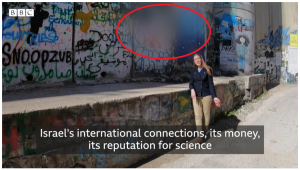
Knell: “This pandemic’s been revealing. Israel’s international connections, its money, its reputation for science, all helped it to get vaccines. While the Palestinians – relatively poor, stateless and a lot less organised – have been at a big disadvantage. It’s clearly shown the interdependence of both sides, but also the deep divisions.”
Like her Jerusalem bureau colleague, Knell predictably avoided any mention of the fact that the Palestinian Authority chooses to spend millions of dollars every month on stipends for terrorists who committed attacks of the kind that the anti-terrorist fence she chose to use as context-free backdrop ‘symbolic’ of those “deep divisions” is designed to prevent.
Clearly viewers of this relatively lengthy report did not get to see both sides of the story. The monochrome messaging from interviewees together with Knell’s inadequate presentation of the context to the topic served only to further mainstream the political campaign to which the BBC self-conscripted at the beginning of the month.
Nevertheless, the BBC chose to widely promote Knell’s report on a range of additional platforms. Audio versions were aired on the same day in two editions of the BBC World Service radio programme ‘Newshour’ (from 33:46 here and from 18:57 here) and on the BBC Radio 4 programme ‘PM’ (from 50:23 here). The audio version was also included in the January 26th edition of the BBC’s ‘Global News Podcast’ (from 12:22 here) and, according to reports we have received, a version was shown on BBC Scotland’s ‘The Nine’ programme on January 25th.
Related Articles:
BBC’S LYSE DOUCET EXPLOITS CORONA VACCINATIONS STORY TO PROMOTE POLITICAL NARRATIVE
BBC’S BATEMAN FAILS TO UNRAVEL CORONAVIRUS VACCINATIONS CANARD
BBC RADIO ULSTER CLAIMS ISRAEL VACCINATION FIGURES ‘FAKE’
BBC NORTHERN IRELAND RESPONDS TO CAMERA UK COMPLAINT ON VACCINATIONS ITEM
BBC WS RADIO CONTINUES TO AMPLIFY POLITICAL CAMPAIGN ON VACCINES
BBC NEWS CHANNEL PROMOTES POLITICAL CAMPAIGN ON CORONA VACCINES
BBC JERUSALEM CORRESPONDENT CONTINUES TO CLOUD VACCINATIONS ISSUE
BBC’S ‘DATELINE LONDON’ PROMOTES OSLO ACCORDS HEALTHCARE FALSEHOOD
BBC CONTINUES MULTI-PLATFORM PROMOTION OF POLITICAL VACCINATIONS CAMPAIGN
BBC JERUSALEM CORRESPONDENT’S AMPLIFICATION OF POLITICAL CAMPAIGN PERSISTS
THE PARTIAL SOURCES BEHIND ANDREW MARR’S BBC ONE TALKING POINTS

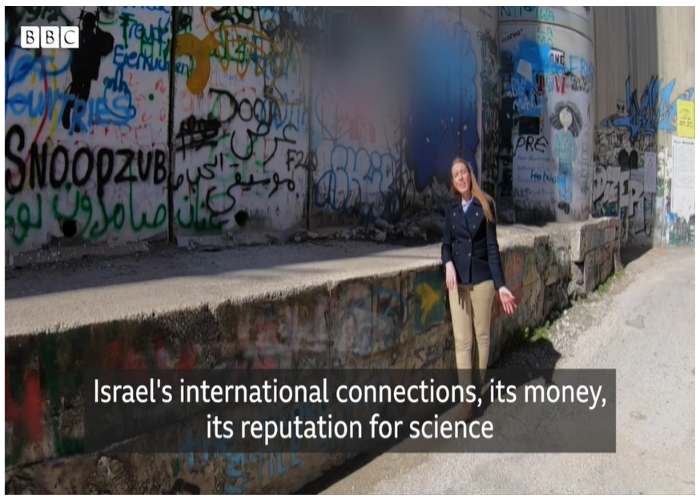
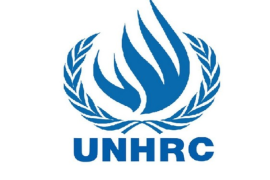
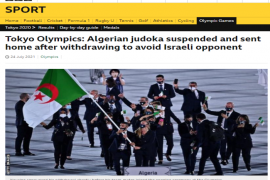
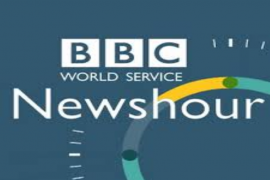
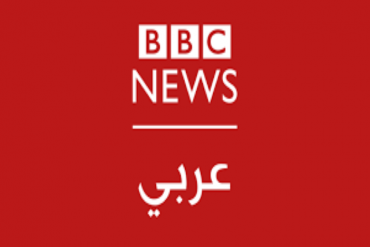
Dr al-Atrash………………..so most appropriately named!
In a UK survey issued by the BBC to audience members (like me), I informed them that the BBC World Service office in Jerusalem issues pure anti-Semitism – and this nonsense from Knell is more proof of that. Can Knell explain why a people that announces daily its intention of removing Israel from the map, encourages murders of Israeli citizens in cold blood and fires a continual barrage of missiles at Israeli civilians should rightfully be handed out vaccines by its self-made enemy ?
The cheeky King Hussein of Jordan (who Israel graciously allows to control certain important Muslim sites in East Jerusalem which his father denied access to Jews from 1947 to June 7 1967) had the audacity yesterday, one again, to interfere with the internal affairs of another country, and demand that Israel vaccinate all Arab residents of areas A & C West Bank & even to top it all Gaza ! It would be a great idea to suggest to him; if he is so concerned, that he buys the required vaccine & conduct the vaccinations asap and may other rich Arab countries could chip in. To date they seem most indifferent to their “kith & kin”.